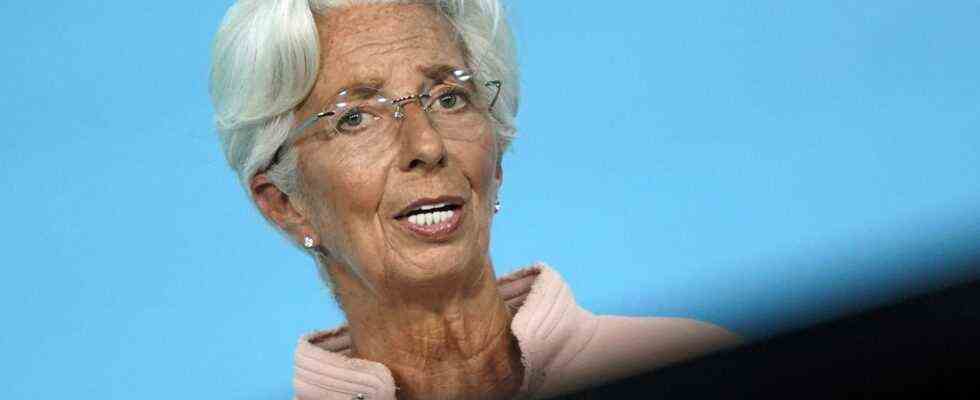Status: 02/11/2022 10:43 a.m
ECB President Lagarde has warned of the consequences of rapid rate hikes. Hasty action could jeopardize the recovery of the economy in Europe, she said. First of all, the development of inflation should be awaited.
The head of the European Central Bank (ECB) sees no immediate need for interest rate hikes, in contrast to the new Bundesbank boss Joachim Nagel. “If we act hastily now, the recovery of our economies could be significantly worse and jobs would be at risk,” Lagarde told the “Redaktionsnetzwerk Deutschland”. The central bank is taking preparatory steps. The pandemic emergency program to buy bonds will end in March and the ECB will reduce the total volume of its net asset purchases.
“The end of net bond purchases is a prerequisite for rate hikes at a later date,” Lagarde said. When asked when the timing was, she said: “We are currently monitoring the rising inflation numbers which we are factoring into our forecast. It is possible that inflation will be higher than we forecast in December. We will be in Analyze March and then see.”
The central banker compared the interest rate policy to driving a car. “Nobody does that in fifth gear at full speed, you just let off the gas and downshift gradually. That’s exactly what we’re doing right now. And as soon as the pace is right and the situation allows it, we take the corner.”
No pressure from wages expected
However, Lagarde does not expect any further surge in inflation due to the forthcoming wage rounds. Wages are fundamentally based on productivity and medium-term inflation expectations, which are currently around the European Central Bank’s target of two percent, said Lagarde. “Only if the deals go significantly and consistently beyond that could they accelerate the inflation process. But we don’t see that at all at the moment.” In most euro countries, including Germany, wage demands are “extremely moderate”. It is understandable and legitimate for trade unions to demand higher wages in this situation in order to maintain the purchasing power of employees.
In his own words, Lagarde expects energy prices to stabilize at a high level. The high cost of oil and gas is not a temporary phenomenon. But the price level is already very high. It is unlikely that oil prices will continue to rise at the same pace. For this reason alone, inflation will slow down.
Inflation at almost five percent
However, inflation rates in Germany, for example, are still very high in a long-term comparison. Goods and services cost an average of 4.9 percent more in January than a year earlier, according to the Federal Statistical Office, confirming its first estimate. After all, the value was slightly lower than in December, when the inflation rate had climbed to 5.3 percent, the highest level in almost 30 years.
And the wholesale prices also point to continued high price pressure. According to the statisticians, they increased at the beginning of the year by an average of 16.2 percent compared to the same month last year. That’s slightly more than December’s 16.1 percent, but less than November’s 16.6 percent, the highest since calculations began in 1962. Wholesale prices are considered a leading indicator of consumer price trends.
The euro falls
On the foreign exchange market, Lagarde’s statements put the euro under pressure. The shared currency fell below the $1.14 mark. Now that the probability has increased that the interest rate differential between the US and the euro area will widen even further. For the USA, the so-called “Fed Watch Tool” of the US futures exchange CME shows that in December the key interest rate will most likely be in a range of 1.75 to 2.00 percent – from the current key interest rate level of 0, 00 to 0.25 percent calculated. Many observers are currently assuming that the US Federal Reserve (Fed) will raise interest rates in six steps this year – starting with the first hike in March.
Yesterday, US Federal Reserve Banker James Bullard, Chairman of the Federal Reserve Bank of St. Louis, told the Bloomberg news agency that, in view of the unexpectedly high inflation rate, key interest rates should be at 1 percent by July 1st. That would mean that there would have to be an unusually large rate hike by then.

